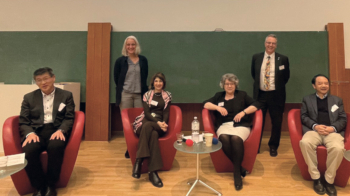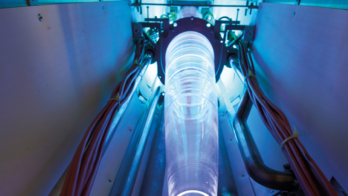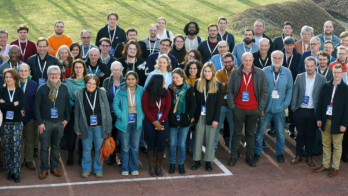Report on a workshop where experts shared ideas for the future.
The United Nations General Assembly has designated 2012 the international year of sustainable energy for all. With leadership from UN Secretary-General Ban Ki-moon, a coordinating group of 20 UN agencies (UN-Energy) will tackle the crucial challenges of sustainable access to energy, energy efficiency and renewable energy at the local, national, regional and international levels. So what can big science do for global climate and energy challenges?
Catherine Césarsky, High Commissioner for Atomic Energy and member of the CERN Council, believes that research infrastructures (RIs) in particular are appropriate tools for addressing these challenges scientifically, validating and providing scientific knowledge and in this way contributing to the decision-making process. When it comes to technical solutions, large-scale RIs, being intrinsically energy intensive, can provide their know-how in improving energy management and share their mid- and long-term strategies for reliable, affordable and sustainable carbon-neutral energy supply.
Act now, save later
Research infrastructures have considerable expertise regarding energy savings and efficiency approaches.
It was with this message that Césarsky opened the first Joint Workshop on Energy Management in Large Scale Research Infrastructures, which was organized by CERN, the European Spallation Source (ESS) and the European Association of National Research Facilities (ERF). It took place in Lund, where the ESS will be built as the first carbon-neutral research facility, and brought international experts on energy together with representatives from research laboratories and future large-scale research projects all over the world. The objective was to identify the challenges and best practice for energy efficiency, optimization and supply at large research facilities and to consider how these capabilities could be better oriented to respond to this general challenge for society.
The quality of energy required and the levels of consumption mean that RIs have a considerable, unique expertise regarding energy savings and efficiency approaches, ranging from research in materials sciences to demonstrators/prototypes of energy efficiency. In particular, the workshop helped to identify several key points:
• The development and demonstration of co-generation (combined heat and power) plus renewable energy go hand in hand with the improvement in the quality of electrical power and a better use of transmission lines (in peak-shaving methods to reduce power drawn at peak times and in storage), while decreasing instrumental black-outs.
• It is important to maximize the re-use of thermal energy generated in various systems, both for heating and cooling (e.g. with heat pumps and absorption refrigerators), thus decreasing the use of primary energy.
• The design of systems should allow the recovery of heat at higher temperatures than in usual design standards, to allow a better re-use and an interaction with local communities to develop district heating if not yet available.
• While new RIs are in the position to introduce energy-saving approaches, there is a need for special support to allow existing RIs to re-fit and increase efficiency; this could be a driver for improved returns to the hosting territory, through increased technology and knowledge transfer.
RIs employ some of the best technicians and applied researchers in the world, who are trained continuously in cutting-edge technology by responding to the technical challenges brought to them by the best researchers. RIs could be the test-bed for completely innovative research-based solutions, such as the use of superconducting lines to manage different energy flows, the installation of superconducting magnetic-energy storage for energy quality control, the transformation of energy between radio frequency and direct current, and other novel schemes involving advanced concepts.
An increase in efficiency in the use of energy will be the major contributor to limiting carbon emissions at large-scale facilities. Energy efficiency will be driven by introducing and demonstrating appropriate methods and breakthrough technologies, including the recycling of waste heat into useful applications.
A recurrent theme of discussion during the workshop was the importance of evaluating the different energy options both in the design of new research facilities and in the upgrade of existing ones. The inclusion of energy-efficiency and recycling requirements at the design stage opens many possibilities and initiatives to all of the stakeholders. For example, high-temperature waste water can be recovered with high efficiency, but equipment manufacturers are rarely asked if high-temperature cooling water can be used to cool their equipment.
As recommendations, the workshop proposed that:
• The design and the construction of facilities should aim at optimizing scientific performance while including the best approach to energy use.
• The optimal balance between investment and operation costs must have a long-term view. A total “cost of ownership” approach is required.
• A clear and objective assessment of overall energy consumption – equipment, buildings and associated information and communication technologies – must be available.
• The use of relatively fine-grained monitoring and active feedback-control tools (including modelling), as well as the specific role of an energy manager, are required.
Towards renewables
In addition to technical aspects, the workshop tackled socioeconomic issues in parallel sessions. These advised investigation and a long-term approach in matters such as: government legislation (tax exemptions, permits and licenses), contracts with energy suppliers, innovative financing, understanding of the energy-load profile, contracts for steady-state and peaks, socioeconomic and environmental impacts and benefits at the host site.
Renewable energies will be important as future sustainable energy sources for RIs. In turn, the RIs can be instrumental in supporting renewable-energy research and technological development through, for example, new and improved materials (for photo-voltaic, fuel cells, improved motors and turbines etc.), the development of environmentally friendly biofuels, and new and safe methods of carbon capture.
Large-scale RIs are able to generate innovative solutions that can be used profitably elsewhere and be at the base of “win-win” partnerships with industries. Their capabilities and staff could also be mobilized for large international projects, e.g., the development of solar power generated in the sun-rich regions of North Africa and the Middle East (MENA). This could supply up to 15% of Europe’s energy needs by 2050 as advocated by the DESERTEC foundation. Technologies to exploit this potential, such as concentrated solar power, exist and are proven. Realizing such ambitious projects, however, will require a new energy and science partnership between Europe and MENA and a closer integration of MENA into the European Research Area.
RIs can be particularly effective in training young researchers, operators and managers to face the upcoming energy challenges.
The workshop showed that several RIs are already mobilizing their unique resources and technical skills to respond to the “energy grand challenge”. They can act as a test-bed for implementing appropriate energy-supply and procurement schemes as well as efficient energy-use. RIs can also be particularly effective in training young researchers, operators and managers to face the upcoming energy challenges in order to co-operate on R&D, exchange best practices and provide know-how. Planned by Frédérick Bordry (head of CERN’s Technology Department), Thomas Parker (ESS energy manager) and Carlo Rizzuto (chair of ERF and president of Sincrotrone Trieste – Italy), the workshop attracted 150 participants, indicating a clear requirement for this type of initiative. The unanimous consensus on such a need was supported by CERN with the proposal to host a second workshop in 2013.





